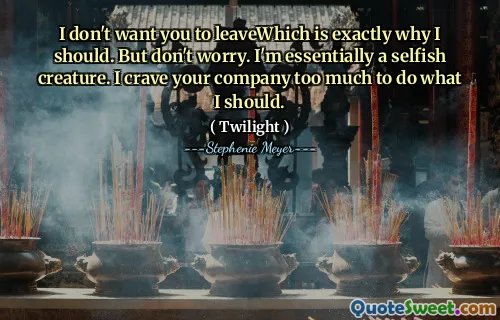He called you pretty...That's practically an insult, the way youlook right now...You're much more than beautiful.
In the quoted passage from "Twilight" by Stephenie Meyer, the speaker expresses a deep appreciation for the person's appearance, suggesting that calling her "pretty" undervalues her true beauty. It highlights a theme of how superficial compliments can miss the mark, emphasizing that the individual's worth transcends mere physical attractiveness. This dialogue emphasizes a deeper connection and admiration, suggesting that the character recognizes qualities that make the person special. Instead of conforming to societal standards of beauty, the acknowledgment of being "much more than beautiful" suggests a richer, more profound relationship and understanding between the characters.
In the quoted passage from "Twilight" by Stephenie Meyer, the speaker expresses a deep appreciation for the person's appearance, suggesting that calling her "pretty" undervalues her true beauty. It highlights a theme of how superficial compliments can miss the mark, emphasizing that the individual's worth transcends mere physical attractiveness.
This dialogue emphasizes a deeper connection and admiration, suggesting that the character recognizes qualities that make the person special. Instead of conforming to societal standards of beauty, the acknowledgment of being "much more than beautiful" suggests a richer, more profound relationship and understanding between the characters.






